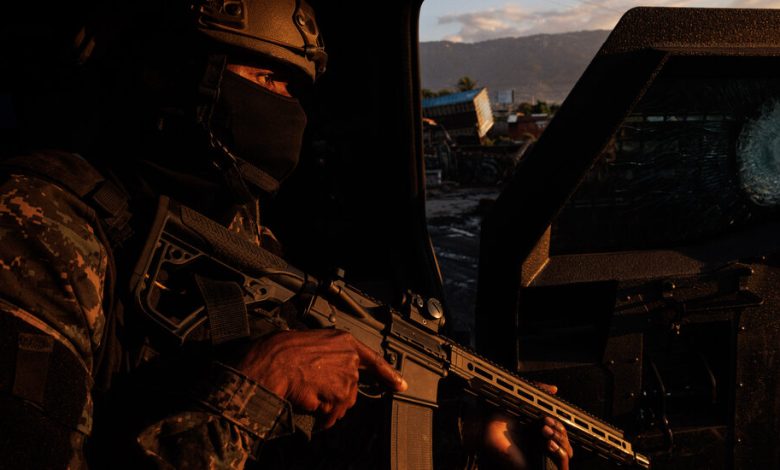As Haiti Unravels, U.S. Officials Push to Send in an Armed Foreign Force

After days of gunfights in early November, Haitian police officers emerged triumphant: They had finally liberated the nation’s biggest port from the gangs that had taken it over for two months.
But when members of Haiti’s SWAT team returned to the shantytown that surrounds the port just days later, they still did not feel safe enough to even leave their armored truck.
The officers anxiously scanned rows of rusty shacks for hidden gunmen, too wary of the danger outside to open the doors.
The upshot was clear: The police keep trying to fight back, but gangs still run much of Haiti.
The assassination of Haiti’s president last year set off a new wave of terror across the Caribbean nation. But conditions in the country have plunged to horrifying new lows in recent months, as gangs carried out such extreme violence that the carnage has been compared to civil war.
Now, fearing that the humanitarian crisis engulfing Haiti could spur mass migration to the United States and elsewhere, some top Biden administration officials are pushing to send a multinational armed force to the country, several current and former officials say, after the Haitian government made an appeal for such an intervention last month.
But the United States doesn’t want its own troops included in that force, even though officials fear that the tumult in Haiti will send an even bigger wave of migrants to American shores.

The view from an armored vehicle belonging to Haiti’s National Police SWAT team while patrolling Cité Soleil.
Already, the number of Haitian migrants intercepted by the U.S. Coast Guard has increased more than fourfold since last year, with many setting sail in overcrowded boats known to capsize in rough waters.
“That has always been the U.S. government’s biggest Haitian nightmare, a mass migration event,” said Daniel Foote, who served as the U.S. special envoy to Haiti for part of last year. “It’s already upon us; the next step becomes biblical, with people falling off anything that can float. We aren’t that far away from that.”
Haiti’s government took the extreme step of requesting foreign armed intervention last month to curb the unrest subsuming the nation. It was an explicit acknowledgment of how desperate the instability has become, in a country that remains deeply resentful of past foreign interventions.
While United Nations peacekeepers were last stationed in Haiti in 2010, they brought cholera to the country, scientists say, causing one of the worst outbreaks in modern times. Nearly 10,000 Haitians died, and respect for the United Nations in Haiti was “forever destroyed,” Ban Ki-moon, the U.N. secretary general at the time, later wrote.
Now, the Biden administration is encountering resistance to rallying a multinational force, including from American military leaders who do not want to be drawn into a mission that would require a significant amount of time and resources, the U.S. officials said.
A U.S.-backed resolution urging the deployment of a “rapid action force” to Haiti has stalled in the U.N. Security Council, but the administration has continued to lobby allies to make boots on the ground a reality. Still, administration officials say the force should not include U.S. troops, arguing that Haiti remains scarred by America’s long history of messy and sometimes brutal intervention in the country, including an occupation that lasted almost two decades.
For now, Haitians are navigating several catastrophes at once, without much help from their government — or anyone else.
Biennaise Mesilas, 64, was doing laundry a few months ago when a neighbor brought her son’s body home in a wheelbarrow full of blood.
The 24-year-old had been selling sacks of water in their hometown, Cité Soleil, the largest slum in Haiti’s capital, when gunfire erupted and a stray bullet caught him above the eye.
“When that happened to my son, that was the end of everything for me,” Ms. Mesilas said.
She couldn’t get to the cemetery because of the constant shooting. So she dug a grave near her home, an unsuitable burial ground flooded from the rainy season, and spread stones on the coffin so it would sink into the dirt. Ms. Mesilas fled the area soon after.
“If I had stayed longer in Cité Soleil, I would have died,” she said.
She moved to a public plaza where thousands of displaced people settled after gang warfare broke out in the slum in July. Children, shot while playing outside or walking home, recovered from their wounds while sleeping on cardboard and cement.
This month, the authorities kicked everyone out of the makeshift camp, leaving entire families to roam dangerous streets in search of shelter.
Political turmoil has produced several waves of migration from Haiti in years past. Haitians left en masse during the dictatorship of Jean Claude Duvalier, known as Baby Doc, who ruled Haiti from 1971 to 1986. A military coup that overthrew a democratically elected president in 1991 launched a cascade of boats carrying tens of thousands to the coast of Florida.
There are signs that a new exodus may be coming. Across the border in the Dominican Republic, which shares an island with Haiti, the government has cracked down on Haitian migrants so harshly that the U.S. authorities recently said “darker-skinned” Americans were at risk of being targeted.
At sea, more than 7,000 Haitians were intercepted by the U.S. Coast Guard from October 2021 through September of this year, compared with 1,527 during the previous 12 months.
Their perilous journeys are driven by a constellation of horrors.
For the first time ever, the United Nations documented “catastrophic” levels of hunger in Haiti last month, leaving thousands facing famine-like conditions.
Cholera recently reappeared in the country for the first time in years, an outbreak that spread partly because gangs prevented aid workers from delivering basic care in the poorest areas.
Rival armed groups have set fire to entire neighborhoods in turf battles, killing husbands in front of their wives and raping mothers within view of their children. Kidnappings reached an average of four abductions per day in October, according to the U.N.
Critics of the Haitiangovernment fear that the arrival of foreign forces would only strengthen a tenuous claim to power by Prime Minister Ariel Henry, who has run the country for more than a year without being confirmed by Parliament.
“We cannot keep supporting this government that has brought us to this brink,” said Monique Clesca, a member of the Montana Accord, a coalition of civil society and political parties that opposes Mr. Henry’s call for intervention.
Bitter memories remain from the most recent attempt by outsiders to stabilize Haiti. The U.N. peacekeeping mission that spent more than a decade in the country had some success subduing gangs in Cité Soleil but was also accused of committing widespread sexual violence before departing in 2017.
Still, Ms. Clesca and so many in Haiti have come to believe that the dystopian status quo is no longer tenable.
“We are living a hellish existence,” Ms. Clesca said, “if you can call it existence.”
Desperate for even the briefest respite from the violence, some Haitians have come to believe that the only option left is to accept yet another incursion from abroad.
“I think most Haitian people would tell you they need intervention,” said Pierre Espérance, the executive director of the Haitian National Human Rights Defense Network. “They are tired with the government, they are tired with the police, they are tired with the gangs, and they cannot move around the country.”
Ms. Mesilas, whose son was killed, has no faith in the Haitian government. But she also has no time for people who think the country can go on any longer without the help of foreign forces.
“The reason they are saying this is that they don’t face the same situation as we are facing,” she said. Foreign forces “would be good for us,” she said, “because we live in misery.”
Frantz Elbé, the Haitian police chief, called the mission to retake the port “a great victory for the country” but acknowledged that his forces were battered in the process.
“They had a lot of high-caliber guns that caused a lot of damage,” Mr. Elbé said of the gangs, adding, “I can use all the support I can get.”
U.S. officials say that a force of around 2,500 military and police officers could be enough to secure the country’s main arteries, so that goods can flow freely, according to two administration officials.
But the Biden administration has not yet persuaded any other country to lead such a mission.
Canada has resisted, in part because it is wary of sending security assistance if it is not supported by the political opposition in Haiti, officials say. Brazil has also demurred, with officials telling Reuters this month that it is unlikely to get involved.
The risks of sending armed forces to Haiti are high, with uncertain rewards. Winning battlefield victories would not wipe out the gangs, past experience shows, because it would not touch their true source of strength: longstanding ties with Haiti’s economic and political elite.
Gangs have existed here for decades, experts say, because they are backed by those in power who use the groups to cement their hold on Haiti.
“If you bring military forces before solving the political crisis it will not work,” said Mr. Espérance. “There are too many connections between the police, the authorities and the gangs.”
Mr. Espérance wants foreign countries to push Mr. Henry to reach a meaningful agreement with the opposition but does not think Haiti has time to wait for the prime minister to give up power before accepting help for law enforcement.
“I understand the victims,” Mr. Espérance said. “I know the police we have today; they are not able to do the job.”
In recent months, gangs have aggressively expanded their empires, establishing control without much resistance from the authorities. Large expanses of the capital are now impenetrable without risking attack by the criminals who rule over them like warlords.
Caught in the middle are Haitians like Dr. Hubert Morquette, who lives on the grounds of the hospital he runs in Port-au-Prince because he is too scared to make the journey to and from his home every day.
“I don’t like interventions, but it’s a matter of survival,” Dr. Morquette said, shrugging. “There’s no other option.”
Andre Paultre contributed reporting from Port-au-Prince, Haiti.





